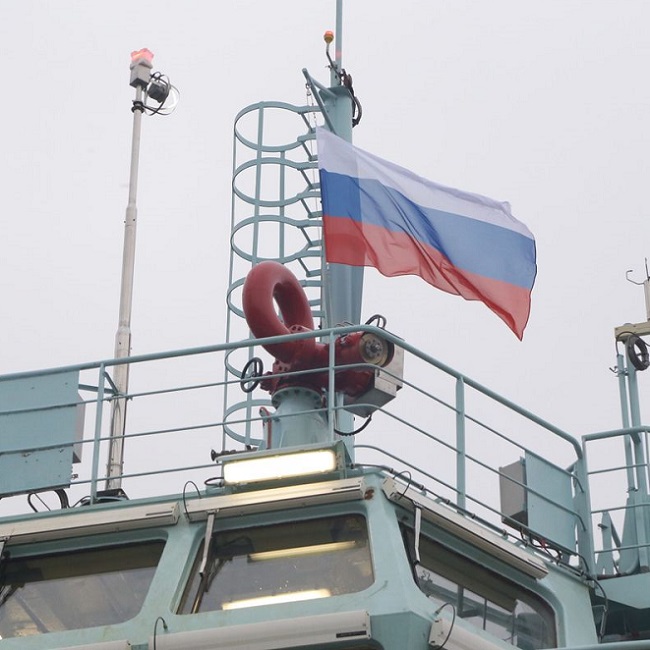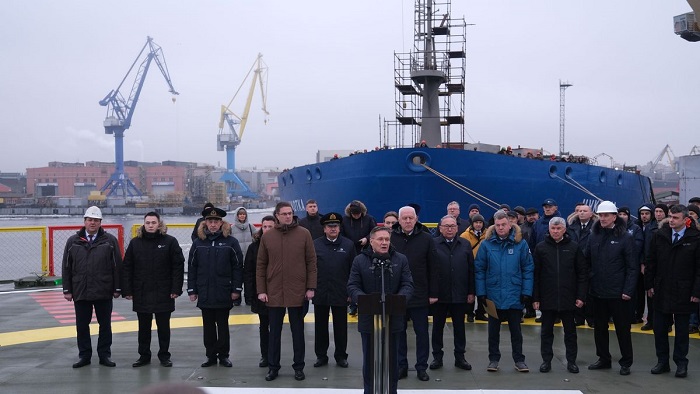
On December 28, 2024, an official ceremony was held in St. Petersburg to hoist the Russian national flag on the third serial universal nuclear-powered icebreaker Yakutia of Project 22220, which is being built by order of FSUE Atomflot (a Rosatom’s enterprise).
The solemn ceremony was attended by Anton Alikhanov, Minister of Industry and Trade of Russia (via videoconferencing); Alexey Likhachev, Rosatom Director General; Alexander Gutsan, Plenipotentiary Representative of the Russian President in the Northwestern Federal District; Andrey Buzinov, First Deputy Director General of United Shipbuilding Corporation JSC; Alexander Konovalov, Director General of the Baltic Shipyard; Yakov Antonov, Acting Director General of FSUE Atomflot; Dmitry Nikitin, Captain of the Yakutia icebreaker; the crew of the Yakutia icebreaker; the trial crew of the Baltic Shipyard; and a delegation from Yakutia headed by Andrey Fedotov, Permanent Representative of Yakutia to the Russian President.
Alexander Gutsan read out the greeting from the Russian President Vladimir Putin. In particular, it said, “Successful implementation of this ambitious project is the result of creative endeavors by researchers and dedicated work by shipbuilders of the Baltic Shipyard and specialists from many other Russian companies. I would like to express my heartfelt gratitude to everyone who took part in creating this modern vessel, equipped it with state-of-the-art technology, employed advanced materials and engineering solutions. I am convinced that the Yakutia icebreaker will enhance the potential of our nuclear-powered fleet and facilitate addressing major multidimensional tasks that our country’s economy is facing today, as well as reinforcing Russia’s positions as a maritime power.”

Alexey Likhachev, Rosatom Director General, commented, “There are already eight vessels in our nuclear icebreaker fleet. By 2030, the icebreaker group on the Northern Sea Route is set to reach 17 vessels. In November, another record for transit was achieved at the NSR. It exceeded three million tons. Now I can confidently say that we have already reached a new maximum and set a new record for the total volume of cargo transported via the NSR this year. The volume is very close to 38 million tons.”
The Head of Yakutia Aysen Nikolaev sent his greetings to the icebreaker builders and attendees of the flag-raising ceremony. “I express my sincere gratitude to all the specialists involved in the construction of this modern and powerful icebreaker! Laying down the Yakutia icebreaker at the Baltic Shipyard was a historic event for Yakutia. The icebreaker was launched in the year marking the 100th anniversary since the establishment of the Yakut ASSR. We are grateful to Rosatom State Corporation for naming one of the largest and most powerful icebreaker vessels in the world after our Yakutia. We are also grateful to FSUE Atomflot for including Yakutians in the icebreaker crew,” the greeting said.
Reference
The contract for building two icebreakers, Yakutia and Chukotka, was concluded in August 2019. The Project 22220 icebreaker was laid down in May 2020 at the Baltic Shipyard. The icebreaker is 172.7 meters long and has a minimum operational draft of 9.03 meters.
In November 2022, the Yakutia icebreaker was launched. The Russian President Vladimir Putin took part in the ceremony dedicated to this event via videoconferencing. On December 1, 2024, the icebreaker embarked on builders sea trials.
Yakutia is the fourth icebreaker actually built under Project 22220. Its service life is 40 years. As is the tradition, the icebreaker is named after a region adjacent to the Northern Sea Route.
Hoisting the flag is one of the important maritime traditions that have developed since the creation of the regular Russian Navy.
The comprehensive development of Russia’s Arctic territories is a strategic priority for the Russian State. It is essential to intensify the NSR transportation for accomplishing the assigned tasks. To expand this logistics corridor, we are implementing regular cargo services, building new nuclear icebreakers, and updating the relevant infrastructure. Rosatom’s enterprises are contributing heavily to this endeavor.